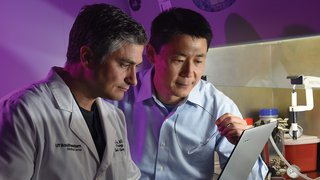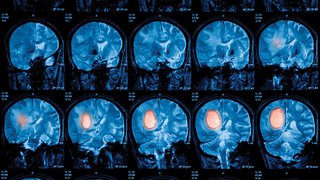Pioneering an Initiative to Adjust NCI Policy
August 8, 2022
Clinical Trials at UT Southwestern
As an academic medical center, UT Southwestern offers clinical trials that give eligible patients access to the newest therapies. Learn more about clinical trials at UT Southwestern.
A Simmons Cancer Center-led campaign to change NCI policy expands the role of advanced practice providers in cancer clinical trials.
For decades, UT Southwestern Harold C. Simmons Comprehensive Cancer Center has been recognized as a leader in the development of cancer policy. Erin Williams, M.B.A., Associate Director of Clinical Research Operations at Simmons Cancer Center, is part of a group of experts at UT Southwestern heading initiatives aimed at allowing advanced practice providers (APPs) to carry out the full scope of their education and training.
“Our recent efforts helped influence a National Cancer Institute [NCI] policy change, allowing APPs to sign orders for chemotherapy or investigational agents on established treatment plans within NCI-funded clinical trials,” Ms. Williams says.
Simmons Cancer Center’s mission includes optimizing access to patient care and providing patients the opportunity to participate in clinical trials. The role of APPs is central to this mission.
“This change in APP practice benefits patients by providing them a more efficient way to participate in clinical trials while also allowing APPs, such as myself, to practice at their full scope.”
Alyssa Macchiaroli, M.S.N., APRN, AOCNP

Opportunity for Improvement
Most of Simmons Cancer Center’s medical oncology APPs are educated and privileged to manage and sign anti-neoplastic therapy orders as assigned by physicians per UTSW policy. The NCI’s Cancer Therapy Evaluation Program (CTEP) did not, by policy, allow APPs to sign orders for investigational drugs being delivered by NCI CTEP-supported treatment trials.
Currently, the NCI CTEP funds more than 100 active Simmons Cancer Center trials (~30%). Thus, Simmons was compelled to implement a policy prohibiting chemotherapy-privileged APPs from signing investigational orders on any treatment trials because of the inability to manage this process differently, study by study.
“We reached out to leadership at the NCI to open a dialogue about this issue,” Ms. Williams says. “NCI reached out to SCCC as well as stakeholders at Vanderbilt and other key cancer institutions to hold discussions on this topic.”
Policy Change
After further discussion among key stakeholders, surveys on the role of APPs related to signing chemotherapy orders were deployed by the NCI to all participating centers. Effective Sept. 1, 2021, CTEP reversed its policy, allowing APPs to sign orders for therapeutic trials in accordance with organizational and state statutes.
As a result, Simmons Cancer Center began updating studies to include prescriptive ability for APPs to sign investigational drug orders. This change is expected to improve patient access to care, as well as increase efficiency and quality of care.
“This change in APP practice benefits patients by providing them a more efficient way to participate in clinical trials while also allowing APPs, such as myself, to practice at their full scope,” says Alyssa Macchiaroli, M.S.N., APRN, AOCNP, a nurse practitioner at UTSW. “The new policy improves patient safety as orders are signed in real time by the provider evaluating the patient for treatment.”
Erin Williams, M.B.A., is the Associate Director of Clinical Research Operations at Harold C. Simmons Comprehensive Cancer Center.
Alyssa Macchiaroli, M.S.N., APRN, AOCNP, is a board-certified adult gerontology nurse practitioner at Harold C. Simmons Comprehensive Cancer Center, specializing in oncology clinical trials.












